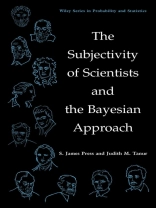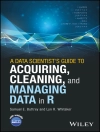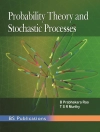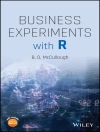Comparing and contrasting the reality of subjectivity in the work
of history’s great scientists and the modern Bayesian approach to
statistical analysis
Scientists and researchers are taught to analyze their data from an
objective point of view, allowing the data to speak for themselves
rather than assigning them meaning based on expectations or
opinions. But scientists have never behaved fully objectively.
Throughout history, some of our greatest scientific minds have
relied on intuition, hunches, and personal beliefs to make sense of
empirical data-and these subjective influences have often aided in
humanity’s greatest scientific achievements. The authors argue that
subjectivity has not only played a significant role in the
advancement of science, but that science will advance more rapidly
if the modern methods of Bayesian statistical analysis replace some
of the classical twentieth-century methods that have traditionally
been taught.
To accomplish this goal, the authors examine the lives and work of
history’s great scientists and show that even the most successful
have sometimes misrepresented findings or been influenced by their
own preconceived notions of religion, metaphysics, and the occult,
or the personal beliefs of their mentors. Contrary to popular
belief, our greatest scientific thinkers approached their data with
a combination of subjectivity and empiricism, and thus informally
achieved what is more formally accomplished by the modern Bayesian
approach to data analysis.
Yet we are still taught that science is purely objective. This
innovative book dispels that myth using historical accounts and
biographical sketches of more than a dozen great scientists,
including Aristotle, Galileo Galilei, Johannes Kepler, William
Harvey, Sir Isaac Newton, Antoine Levoisier, Alexander von
Humboldt, Michael Faraday, Charles Darwin, Louis Pasteur, Gregor
Mendel, Sigmund Freud, Marie Curie, Robert Millikan, Albert
Einstein, Sir Cyril Burt, and Margaret Mead. Also included is a
detailed treatment of the modern Bayesian approach to data
analysis. Up-to-date references to the Bayesian theoretical and
applied literature, as well as reference lists of the primary
sources of the principal works of all the scientists discussed,
round out this comprehensive treatment of the subject.
Readers will benefit from this cogent and enlightening view of the
history of subjectivity in science and the authors’ alternative
vision of how the Bayesian approach should be used to further the
cause of science and learning well into the twenty-first century.
Cuprins
Prefaceix
1. Introduction 1
2. Selecting the Scientists 17
3. Some Well Known Stories of Extreme Subjectivity 23
3.1 Introduction 23
3.2 Johannes Kepler 23
3.3 Gregor Mendel 26
3.4 Robert Millikan 34
3.5 Cyril Burt 37
3.6 Margaret Mead 43
4. Stories of Famous Scientists 49
4.1 Introduction 49
4.2 Aristotle 51
4.3 Galileo Galilei 60
4.4 William Harvey 71
4.5 Sir Isaac Newton 81
4.6 Antoine Lavoisier 95
4.7 Alexander von Humboldt 110
4.8 Michael Faraday 121
4.9 Charles Darwin 128
4.10 Louis Pasleur 143
4.11 Sigmund Freud 156
4.12 Marie Curie 166
4.13 Albert Einstein 177
4.14 Same Conjecrures About the Scientists 189
5. Subjectivity .in Science in Modern Times: The Bayesian Approach199
Appendix: References by Field of Application for Bayesian Statistical Science225
Bibliography 231
Subject Index 249
Name Index 267
Despre autor
S. JAMES PRESS is Distinguished Professor in the Department of
Statistics at the University of California at Riverside. He is also
the author of Bayesian Statistics: Principles, Models, and
Applications (Wiley) and Applied Multivariate Analysis: Including
Bayesian and Frequentist Methods of Inference.
JUDITH M. TANUR is Distinguished Teaching Professor in the
Department of Sociology at the State University of New York at
Stony Brook. She is also the editor of Statistics: A Guide to the
Unknown and Questions About Questions: Inquiries into the Cognitive
Bases of Surveys.












